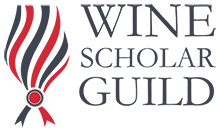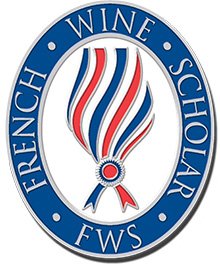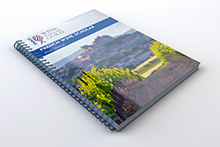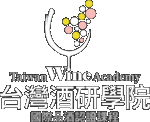
Wine Scholar Guild
WSG葡萄酒學者協會
法國葡萄酒學者認證課程
French Wine Scholar Study and Certification Program

帶領你躋身法國葡萄酒學者的行列
法國葡萄酒學者認證課程(簡稱FWS) 提供最新、最精確與最深入的專業知識。由葡萄酒學者協會 (Wine Scholar Guild) 主導推展並有法國農業部大力支持。授課對象以中高階學員為主

此課程提供你需要學習的所有法國葡萄酒知識
FWS課程涵括法國葡萄酒法律、品種、種植、釀造及所有產區的核心知識。對於葡萄酒銷售、購買與學術研究都至關重要。無論你是從業人員或愛好者,你可透過FWS課程精通法國葡萄酒並在同儕中出類拔萃。若你想攻讀國際高階葡萄酒認證,例如WSET L4、MW、CMS與MS等,FWS提供最好
的補充教材。

FWS全套課程包含兩大項目(A+B)
A. FWS實體講座+專業品飲
- 16大單元教學:共22小時 4小時:學習引導+考前複習
- 專業品評:精心挑選36~45代表酒款
- 實體教材:一本全彩274頁課本,完整解析14大產區,是最鉅細靡遺的法國工具書
- 測驗與證書(一次):英文測驗,考試說明請見下方頁籤(必讀),通過測驗者將獲「法國葡萄酒學者」(French Wine Scholar) 證書與頭銜,姓名後可加掛「FWS」稱號。
18小時:法國14大產區解說,課綱見下方頁籤
B. 加贈線上學習資源:FWS Independent Study Format
- 註冊會員持續享有全世界最專業的葡萄酒線上學習資源一年
- 數位教材:
- 22~25張精美法國產區地圖
- 法國葡萄酒專有名詞字典
- 自我評量測驗
- 正統法語發音練習
- Tasting Skills講義
- 專題大師講座影片
| FWS法國葡萄酒學者認證課程 預約報名表 | 報名方式 | ||
|---|---|---|---|
| 由於目前場地或老師的時間安排還在規劃處理中,您可以先留下您的資料,待新課程確定後我們會主動與您聯絡,謝謝。 |  |
||
| FWS法國葡萄酒學者認證課程 第07期 台北班 | 報名方式 | |||
|---|---|---|---|---|
| 上課日期 | 上課時間 | 上課內容 | 上課地點 | 已額滿 |
| 2022/09/14(三) | 18:45~20:45 | 學習引導 | 酒研安和教室 台北市大安區安和路二段211號2F之2 |
|
2022/09/28(三) 2022/10/05(三) 2022/10/19(三) 2022/10/26(三) |
18:45~20:45 21:00~23:00 |
產區解說 與品評
|
酒訊品酒教室 台北市復興北路356號2F |
|
| 2022/11/02(三) | 18:45~20:45 |
|||
| 21:00~23:00 | 考前複習 | |||
| 2022/11/23(三) | 18:45~20:45 | 筆試 | 酒研安和教室 台北市大安區安和路二段211號2F之2 |
|
| 授課講師 | 林澧竣Eric Lin | |||
| 課程學費 | NT$32,800 報名詳情請逕洽酒研 |
|||
連最偉大的侍酒師Gerard Basset都讚譽有加的進階課程
Gerard Basset課後感言:
「法國葡萄酒學者是非常嚴謹的葡萄酒課程,但趣味橫生,讓您優遊其中。不但教學卓越,
教材品質亦十分出眾。」
Gerard Basset,葡萄酒大師,侍酒大師,2010 年侍酒師大賽世界冠軍
更多名人課後感言,請見下方頁籤。
- 課綱
- 繳費資訊
- 考試內容
- 上課心得
FWS課綱
Detailed Curriculum
The French Wine Scholar™ program presents each French wine region as an integrated whole by explaining the impact of history, the significance of geological events, the importance of topographical markers and the influence of climatic factors on the wine in the the glass. No topic is discussed in isolation in order to give students a working knowledge of the material at hand.
FOUNDATION UNIT:
In order to launch French Wine Scholar™ candidates into the wine regions of France from a position of strength, Unit One covers French wine law, grape varieties, viticulture and winemaking in-depth. It merits reading, even by advanced students of wine, as so much has changed-- specifically with regard to wine law and new research on grape origins.
ALSACE:
In Alsace, the diversity of soil types, grape varieties and wine styles makes for a complicated sensory landscape. Do you know the difference between Klevner and Klevener? The relationship between Pinot Gris, Tokay and Furmint? Can you explain the difference between a Vendanges Tardives and a Sélection de Grains Nobles? This class takes Alsace beyond the basics.
CHAMPAGNE:
The champagne process was an evolutionary one not a revolutionary one. Find out how the method developed from an inexpert and uncontrolled phenomenon to the precise and polished process of today. Learn why Champagne is unique among the world’s sparkling wine producing regions and why it has become the world-class luxury good that it is.
BOURGOGNE:In Bourgogne, an ancient and fractured geology delivers wines of distinction and distinctiveness. Learn how soil, topography and climate create enough variability to craft 101 different AOCs within this region’s borders! Discover the history and historic precedent behind such subtle and nuanced fractionalization.
BEAUJOLAIS:Discover the multi-faceted nature of Beaujolais as expressed through its different soil types and vinification techniques. Learn how carbonic maceration and traditional fermentation changes the flavors in the glass. Find out how varying trace elements in the granitic soils of the Crus Beaujolais create wines of different character and age-ability. Beaujolais may be a light-hearted quaff, but the subject is far from simple.
JURA:The Jura lies tucked between Burgundy and Switzerland and represents the eastern uplift of the Saône graben. Although the wines are rarely found outside the Jura itself, it produces some unique wine products from non-mainstream grape varieties that merit attention. The region is famous for Vin Jaune, but Pasteur, responsible for ground-breaking work in fermentation science and Millardet, responsible for both the “Bordeaux Mixture” and the grafting of French vines onto American rootstock as a solution to phylloxera were born here! But that’s not all! The Arbois zone of production was one of the first to be granted AOC status in 1936. The region is a dynamo!
SAVOIE/SAVOY:Savoie is an alpine region just south of the Jura. Very little wine is exported; most of the production is consumed by tourists who visit for ski and other winter sport. The wines, however, are as colorful as the grapes that go into them--Jacquère, Altesse, Gringet, Molette, Mondeuse Noire, Persan—and are as fun to study as they are to drink…if you are so lucky.
LOIRE VALLEY:Did you know that the Sauvignon Blanc vineyards of Menetou-Salon, Reuilly, and Quincy are all grown on Kimmeridgean marl? That one of the longest-lived white wines in the world is Savennières? Are you familiar with Breton, Côt and Pineau d’Aunis? It’s time to explore a wine culture as long and wide as the river itself. There are over 5 dozen AOCs that flank the banks of the Loire. Learn about the undiscovered treasures of this region and explore its diversity of grape varieties and wine styles.
BORDEAUX:Study Bordeaux from the ground up. Here, wine styles are predicated by a combination of soil, grape and the hand of man. Explore Bordeaux’s distinctive terroirs in order to better understand the nature of the blend, then discover how and why the blend has changed over the past 150 years.
SOUTHWEST FRANCE:Viticulture was established in Gascony before Bordeaux was planted to the vine. Magdeleine Noire des Charentes, the parent of both Merlot and Malbec is believed to have originated here. The grapes are interesting and high-quality, the wines are good but the region languished in obscurity because Bordeaux blocked the Southwest’s access to the global wine market by controlling trade through its port. Landlocked for centuries, this region is finally and justifiably beginning to make a name for itself. This cluster of growing regions has adopted an “all for one and one for all” face to the wine world. And why not? D’Artagnan, the fourth of the three Muskateers hailed from Gascony and coined the phrase!
LANGUEDOC-ROUSSILLON:Although Languedoc and Roussillon were administratively joined in 1972, they are historically, culturally and topographically two distinct regions. Roussillon produces 80% of France’s Vins Doux Naturels crafted from old vine Spanish grape varieties. Yet today, it also crafts many dry blockbuster reds from those same old vines. Languedoc represents a cornucopia of vines that have historically gone into varietally labeled IGP products or simple Vins Sans IG. Today, it re-discovers its terroir and its grape legacy with new AOCs and a collective drive for quality. Together, Languedoc-Roussillon represents the last wine frontier in France. Things have changed here. Keep current!
RHÔNE VALLEY:The Rhône River serves as the gravitational axis around which its two halves revolve; the northern half clings tightly, the southern half expands outward and experiences less pull to the riverbanks. These two different wine cultures possess distinctive soils and topographies and they craft vastly disparate wines with unique personalities. It’s one region, but two brave new worlds. Explore them both.
PROVENCE:Did you know that Provence is the oldest wine region in France? It is also the only region in France and the only region in the world to focus primarily on the production of rosé. In fact, the local vignerons have been perfecting the craft for 2,600 years! Learn all about Provence’s path to pink as well as its stellar production of dry reds and whites. It’s not all sunflowers and lavender in this sun-drenched parcel of France!
CORSICA:
The island of Corsica has a long and colorful past. Throughout the millennia, it has been ruled by no less than six different nations and each of them have left their mark. However, many of the region’s winemaking traditions and grape varieties are Italian due to the island’s close proximity to that country. Today, Corsica is indeed French with an Italian accent. Discover its rich history… in the glass.
親愛的學員您好:
課程學費:NT$32,800
繳費後申請退費或延期:視申請時間有行政費用產生,請參見FAQ第9條說明。
補考方案:請參見FAQ第6條說明。
繳費方式:
銀行轉帳:轉帳資料如下
- 銀行:中國信託南崁分行(822)
- 帳號:510-540-436-886
- 戶名:酒言食語國際有限公司
- 注意:轉帳完成後請務必至轉帳確認回函填寫完您的匯款資料,才完成報名。
FWS考試(必讀)
法國葡萄酒學者認證的 (FWS) 測驗為 100 題選擇題,考試時間:90分鐘。
- 75分以上方可獲頒證書
- 85-90分者加註「高分通過」(pass with Honors)
- 91-100分者加註「最高分通過」(pass with Highest Honors)。
以下內容請務必研讀:
Candidates who follow this in-depth curriculum on the wines of France and pass the exam, earn the French Wine Scholar™ (FWS) post-nominal. The exam is given in multiple-choice format. There are 100 questions covering all of the wine regions of France. Passing score is 75.
PREPARING FOR THE EXAM:In order to prepare properly for the FWS exam, you must read and study the FWS manual carefully. At first, it may seem a daunting body of knowledge to tackle…but we would like to give you a few tips.
What facts are important?- Pay close attention to superlatives (biggest, smallest, highest, lowest, newest, oldest, youngest). Note the facts associated with words such as “first” and “last”. They make for good exam questions.
- Learn the French wine terms and their English equivalents.
- Pay close attention to the passages citing “exceptions to the rule” throughout the text. They also make for good exam questions.
- Know your soils, geography, mountains and rivers.
- Know your grapes and their synonyms.
- Become conversant in France’s AOCs and the primary grape(s) grown within their confines.
- If any particular AOC is responsible for the bulk of the production in any given region, you should know all the particulars about it (minimum alcohol, maximum yield, blending formula etc.) But, no, you do not need to know this type of specific detail about lesser AOCs.
- Know your history and the key individuals who have figured prominently in the development of wine culture of any given region.
- Study the specifics of wine production for white, rosé, red, sparkling, late-harvest, and vin doux naturel. Know the specifics of carbonic maceration.
- Know your sparkling wine label nomenclature (especially as it pertains to champagne) and the terms used to qualify the reductive and oxidative aging of vin doux naturel.
- Study your maps. You need to know where the wine regions and their AOCs are located.
The exam is comprehensive. It will cover all the wine regions of France. This means you must study everything…Corsica too! But, the food and wine pairing texts are for your personal edification. There are no exam questions on this material.
“The French Wine Scholar is a very serious wine program but fun and very enjoyable to follow. The teaching is superb and the quality of the material brilliant."
Gerard Basset, MW, MS, Best Sommelier in the World 2010
「法國葡萄酒學者是非常嚴謹的葡萄酒課程,但趣味橫生,讓您優遊其中。不但教學卓越,教材品質亦十分出眾。」
Gerard Basset,葡萄酒大師,侍酒大師,2010 年侍酒師大賽世界冠軍
"I am very pleased to have earned the French Wine Scholar designation. After completing my WSET Advanced studies, the FWS curriculum allowed me to increase my knowledge of France and their superb wines"
Kirsten Strand, FWS
「獲得 FWS 頭銜讓我滿心歡喜。完成WSET Advanced 認證後,FWS 課程又更加深我對法國產區及其出眾酒款的認識。」
Kirsten Strand,FWS
"The FWS is a great complement to the WSET Diploma and I would recommend other students to take it between the Level 3 and the Diploma.[...] The FWS gave the perfect structure to help me finish my WSET Diploma"
Gregory Crommen, WSET Diploma
「FWS 是 WSET Diploma 的絕佳補完,我會推薦此課程給考完 Level 3、準備去上 Diploma 的學員。[...]FWS 提供一套完美架構,協助我完成 WSET Diploma」
Gregory Crommen,WSET Diploma
"I feel that the Court of Master Sommeliers and Wine Scholar Guild work hand in hand. I am confident that with the preparation on French theory with FWS it will prepare me for the Court of Masters level 3 and 4"
Matt Coleman, General Manager & Sommelier at Crossings Restaurant in South Passadena.
「我覺得侍酒大師協會 (CMS) 和葡萄酒學者協會根本互相串連,有了 FWS 的強化,我對法國理論部分更具信心,可以準備 CMS level 3 和 4 的考試了」
Matt Coleman,加州南帕薩迪納 Crossings 餐廳總經理與侍酒師
“Education is the cornerstone of wine appreciation. With the French Wine Scholar study and certification program, the French Wine Society provides priceless support to the trade and consumers alike."
Xavier Barlier, VP Marketing & Communication, Maisons Marques & Domaines
「有教育為基礎,才能欣賞葡萄酒。在 FWS 課程與認證的協助下,法國葡萄酒協會 (French Wine Society) 為酒商與消費者都提供了無價之寶。」
Xavier Barlier,Maisons Marques & Domaines 行銷與公關副總
“The manual is very well laid out with pertinent information that goes beautifully hand-in-hand with the online program. Highly recommended for both newcomers and well-seasoned wine students alike."
Brian Christ, FWS
「教材內容切中要害,更與線上學習流暢整合。不論您是新手還是老手,都推薦您來上此課程。」
Brian Christ,FWS
“If you are a professional in the wine business looking to enhance your career, this is the program for you. Great instructors, easy-to-follow study guide and 24-hour internet access.”
Ronald Plunkett, FWS, Sommelier at Hakkasan in San Francisco
「若您是葡萄酒從業人員,想在職業生涯更上層樓,就來上這門課吧。這裡有優秀講師,教學指引容易上手,更能 24 小時存取網路資源。」
Ronald Plunkett,FWS,舊金山 Hakkasan 餐廳侍酒師
“The French Wine Society has done an excellent job of creating a study program that appeals to those interested in expanding their knowledge of France and its wine industry. In depth, comprehensive, specific, this course was more detail than anticipated and a lot of fun! If you are a wine professional looking to hone your "Franco-files" or an avid wine enthusiast who wants to geek out a bit, this course is highly recommended.”
Tristan Kindy, FWS
「法國葡萄酒協會建構此課程,真是功德無量,想擴展法國葡萄酒知識與產業資訊的人都可受益。課程內容具體,其深度廣度超乎預期又充滿樂趣!若您身為從業人員,想鑽研法國葡萄酒知識,或是葡萄酒愛好者,想更加傑出,都推薦您來參加本課程。」
Tristan Kindy,FWS
“The program is excellent. It differs in format from many classes taught in that there is a real effort to give context to the regions through discussion of history as well as soils, topography, climate and grapes from each region. The class is not producer driven, but is terroir driven, and teaches students about France as a whole as well as the specific regions.”
Maura O'Brien, FWS
「這個課程太棒了,它對各產區投入大量心力,在歷史、土壤、地形、氣候與品種方面均有深入討論,讓我們全方位理解產區,與其他課程學到的大不相同。此課程並非酒莊導向,而是風土導向,不但學到法國的總體觀,也能學到特定產區細節。」
Maura O'Brien,FWS
“The FWS Program is a very in-depth serious program for the wine professional or enthusiast. There is no other program like it and attaining the qualification should be a highly recognized achievement.”
Nava Ramesh, FWS
「FWS 是極為深入嚴謹的課程,業內或業餘人士都可參加。它和其他課程不一樣,能獲得此認證真是不簡單的事。」
Nava Ramesh,FWS
“FWS program is an in-depth, well-researched certification program that will benefit wine professionals that aspire to increase their professionalism and acquire a deeper understanding of the various French wine regions. You think you know most of the French wine regions? Think again. Take the challenge of the French Wine Scholar program and be a better-informed French wine lover!”
Lim Hwee Peng, CSW International Wine Specialist Singapore”
「FWS 是非常深入、考究嚴謹的認證學程。若您是立志於專業、想盡心學習法國各產區的業界人士,這門課絕對有幫助。你以為你懂法國大部分產區嗎?別傻了,來接受 FWS 的挑戰吧,您會成為更懂法國酒的愛好者!」
林惠平,CSW 新加坡國際葡萄酒專家
“The French Wine Scholar program… is the best, most comprehensive course of study for French wine, bar none. The program is well thought out and presented. Anyone wanting to learn about French wines needs to take this program; there is no better program out there.”
Kevin Cleary, FWS
「FWS 課程…是最佳、最全面的法國葡萄酒課程,無庸置疑。本課程結構周延,解說優異,想學法國酒的都該來這堂課,沒有其他更好選擇了。」
Kevin Cleary,FWS
“In my long experience as a wine educator I can safely say that The French Wine Scholar is the benchmark certified education program for the wines of France. It also provides an advanced level of knowledge and is wholly complementary to those students already in other education programs such as WSET or the Court of Master Sommeliers. Highly recommended!”
Mark Shipway AIWS, FWS
「身為經驗豐富的葡萄酒講師,我可以保證FWS 絕對是法國酒認證課程的翹楚。此課程亦能提供更高階知識,對已在學習其他課程 (如 WSET 或 CMS) 的學員來說是完美互補,極度推薦!」
Mark Shipway AIWS,FWS








